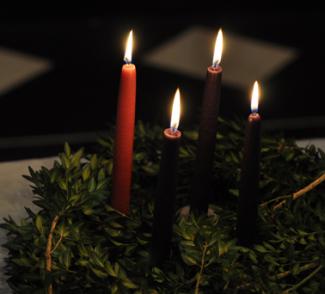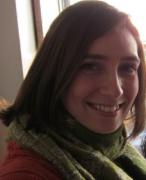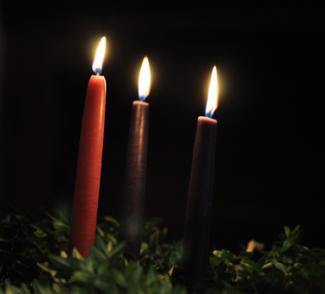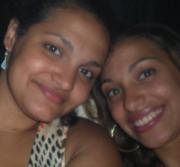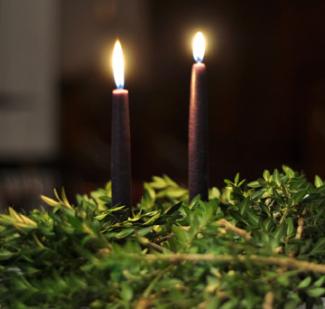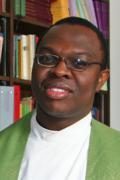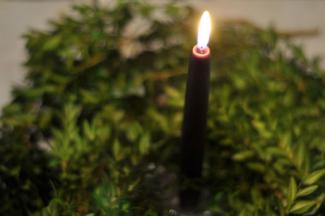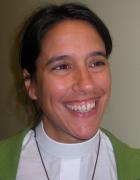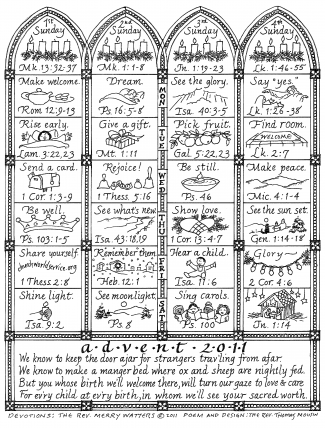The fourth week in Advent:
"The light of Christ is coming"
By Rachael Pettengill
On the first day of Advent my fellow postulant for ordination, Stephen, and I were leading healing prayer at Grace Church in Medford. When it was my turn to receive prayer, I sat down in the chair and said, “I’m exhausted. I’ve been working crazy hours trying to build the community at Tufts, and I’m afraid I let my success dictate my self-worth.” Stephen quietly listened, put his hands on my head and prayed: “God, may you remind Rachael that it is not her ministry but yours, and she is simply joining you in your work.”
That reminder was an ah-ha moment for me! How could I forget that this is God’s ministry and not mine?! How could I lose sight of something so basic when I see, time and time again, God at work among the students?
Across the street from my office is the coffee shop. I spend a lot of time there sitting at a table by the window, drinking coffee and meeting with Tufts students. Most students I meet there have grown up in the church, and now they are either interested in continuing to be part of a faith community at Tufts, or they are returning to the church after a time of exploring what life outside of a community of faith is like. However, in the month leading up to Advent, I met with a number of students who didn’t grow up in the church at all. For one reason or another they decided to come to our Sunday worship service, and on finding the community to be so warm and welcoming, they were intrigued and wanted to learn more. So, I bought them coffee, listened to their stories and told them ours. I have had the opportunity to be a witness as God calls the beloved to God’s self.
The best part of my job is getting to talk with someone about Jesus, and about how having a relationship with him is life-transforming. Our church community is built on relationships with people, and the heart of those relationships is our relationship with him—Jesus who came down from heaven and was made human, who became like one of us and experienced the fullness of life on earth. It is Jesus who knows us, understands us, loves us, saves us and accomplishes his purposes in the world through us. And it is this same Jesus whose coming we eagerly wait and hope for in the season of Advent.
It is my hope this Advent that we who work for Christ remember that it is we who join him in his work, and not the other way around. It is God who works through us to heal this world, and that healing begins with the spreading of the Gospel—telling others of Jesus, and teaching them how to live in relationship with him.
The light of Christ is coming into the world. Let us join him in spreading his light and love throughout the world. Amen.
Rachael Pettengill is a postulant for Holy Orders in the Diocese of Massachusetts. She serves on the staff at Grace Church in Medford and is the Protestant chaplain at Tufts University.
The third week in Advent:
"All life's moments: hope"
Hope is the thing with feathers
That perches in the soul,
And sings the tune without the words,
And never stops at all,
And sweetest in the gale is heard;
And sore must be the storm
That could abash the little bird
That kept so many warm.
I've heard it in the chilliest land
And on the strangest sea;
Yet, never, in extremity,
It asked a crumb of me.
--Emily Dickinson
By Sasha Grullon
I was introduced to this poem as a young adolescent, and since then the poem and its main theme of hope have been very important in my life. Not too long after I first discovered the poem, my sister was diagnosed with cancer. The poem and what it held passed from me to her, to guide her in a time when she would need it the most. Hope was what kept my sister fighting. The idea that perhaps one day she would be free of cancer is what attracted my sister, and our entire family, to hope. My sister could not survive without it, none of us could. We never lost hope with her and though the odds were against us, every statistic, every chance was against us, there was always a glimmer of hope. Even during my sister’s final days, we never lost hope. We fought until her last breath. That moment made me realize that all life’s moments are about hope. How can we, human beings, be without it and still manage to function through everyday struggles and conflicts? We need hope to know that the day will come when we will not hurt any more.
The season of Advent is a season of hope. The word “advent” originates from the Latin word adventus, which means “coming.” It is about a special day that should be highly anticipated, because it could mean that a new chapter in a person’s life will begin, like that on the day Jesus was born. I like the idea of looking at this time of year from a different point of view: instead of seeing this time of year solely as being about giving and receiving material items, we should also focus on the hope to continue on this journey of life.
After learning the meaning behind the season of Advent, I find Emily Dickinson’s poem also seems to set a tone for this time of year. Even through the darkest and coldest of times, in the literal sense, we can still feel the same warmth that Dickinson was speaking about when she describes hope and how it “kept so many warm.” One could say that the hope in the poem is similar to the love that God has for each and every one of God’s children, love that never expects anything in return: “Yet, never, in extremity, / It asked a crumb of me.” God is always there hoping that one day we will all love the way God loves us, unconditionally.
Sasha Grullon (pictured, right, with her sister Darlene) is a 23-year-old nursing student at Salem State University and a member of St. Peter’s Church/Iglesia San Pedro in Salem. She works as a clinical assistant at Children’s Hospital in Boston, and hopes to continue her career there, working with cancer patients as an oncological nurse when she graduates in May 2012 with her bachelor’s degree.
The second week in Advent:
"Bring compassion, everywhere"
By The Rev. Moses O. Sowale
Advent reminds me of the legend of the “Lamed-Vow.” It is a story in the book My Grandfathers Blessing by Rachael Naomi Remen, a very old story from the time of the prophet Isaiah that her grandfather had told her. In it, God says that the world will be allowed to continue as long as, at any given time, there is a minimum of 36 good people, people who are capable of responding to the suffering that is part of the human condition. If at any time there are fewer than 36 such people, the world will come to an end.
Rachael asked her grandfather if he knew who these people were. He said, “No, only God knows who the Lamed-Vovniks are. Even the Lamed-Vovniks themselves do not know for sure the role they have in the continuation of the world, and no one else knows either. They respond to suffering, not in order to save the world but simply because the suffering of others touches them and matters to them.”
Brockton, the city in which I serve, reflects great diversity, with Anglos and immigrants from all over the world—Cape Verdeans, Haitians, Portuguese, Jamaicans, Trinidadians, Nigerians, Kenyans and more. Many of these are people who have survived marginalization and oppression and have become relatively successful; they have become like “a wounded healer” to their fellow brethren who may be passing through experiences they too have known. To me, this is the meaning of Advent: bringing relief and compassion to God’s people everywhere.
Thousands of people are still experiencing suffering, suffering not just of the body but also of the soul. Many fathers are in jail and many mothers have to do two to three jobs to fend for themselves and their kids. Many kids are deficient of parental love and care due to the breakdown of the family system, and since either parent has little or no time stay at home, kids have the only option of learning from peers and from the Internet. Our streets are filled with homeless and hopeless people; addiction and violence are a common tune of our day-to-day life. Yet we are not left without hope; we are blessed with the hope of Advent.
This is the kind of community we are called to minister to at this time. Rachel Naomi Remen explained in her story that the Lamed-Vovniks could be tailors or college professors, millionaires or paupers, powerful leaders or powerless victims. These things were not important. What mattered was only their capacity to feel the collective suffering of the human race and respond to the suffering around them. “Anyone you meet might be one of the 36 for whom God preserves the world,” Rachael’s grandfather had said. “It is important to treat everyone as if this might be so.”
The Episcopal Diocese of Massachusetts through Grace Chapel Episcopal/Anglican Ministry in Brockton, in partnership with First Evangelical Lutheran Church, has enabled me to do what I love doing best: meeting people where they are, not only bringing people to church but also bringing the church to people. I do not know how many Lamed-Vovniks I have met on the streets of Brockton, and I don’t even think I am qualified to be one of them, but I know that there is healing and wholeness in our relationships as people are reminded of who they are, without shame, intimidation or prejudice.
I invite everyone to welcome this Advent season by treating everyone we meet on our way as if they might be one of the people for whom God preserves the world.
Rachael Naomi Remen writes: “We do not serve the weak or the broken. What we serve is the wholeness in each other and the wholeness in life. The part in you that I serve is the same part that is strengthened in me when I serve. Unlike helping and fixing and rescuing, service is mutual.”
May the blessings and joy of this season be yours. Amen.
The Rev. Moses Sowale is the missioner for Grace Chapel, the Episcopal/Anglican ministry in Brockton, located at First Evangelical Church in Brockton.
The first week in Advent:
"Giving and receiving until we've built the kingdom to come"
By The Rev. Cristina Rathbone
I just looked it up: the word healing comes from the old English haeling, meaning literally "restoring to wholeness." This makes sense --at least to me--because my own deepest hope for healing among us this year is that the distinction between those who give and those who receive disappear altogether, and that the deep healing that giving brings might no longer be reserved for just some of us--the ones who seem to have so much already--but might begin instead to be shared by us all.
We are taught that it is in giving that we most deeply receive and in my experience this has been right. I rarely feel more alive than when I am giving to another in love. But more and more this has come to seem like only half the story. Which is more generous, after all (and which more honoring, not of ourselves, nor of the generosity of our institution, but of the ones in need themselves): to give only, or to be open to receiving as well? To help only, or to allow ourselves also to be helped? I work with unhoused people on the streets of Boston pretty much every day, and this is what they are teaching me.
Giving to those in need, to those living in shelters, on the street or locked up behind bars in prisons and jails and immigration centers is good, and we should go on doing it, absolutely. But receiving from these, our brothers and sisters, is even better. Because by daring to receive, we make ourselves vulnerable to the power of their own gifts and so open the path to healing--to wholeness--for us all.
In fact on this, the first week of Advent, I’m wondering again whether this isn’t pretty much what our God did with the incarnation, not only giving every last drop of himself to us but also, by choosing to come to us as a baby, naked in a broken-down shed, offering us the opportunity to give to him as well? Here it is we who are the poor and the imprisoned and the homeless, yet far from making us passive receivers of his benevolent aid, Christ asks that we become his co-creators instead–-giving and receiving, giving and receiving, giving and receiving, until together we have built the kingdom to come.
During this season of Advent then, as we gather gifts not only for those we love but also for those around us in very real need, perhaps we might consider going one step further. Try simply asking a person in need to pray for you next time you see one another, then hang around for a bit to see what happens. Giving is wonderful--yes! Let’s do it, certainly and in abundance! And then also, let's all dare to receive, and to go on receiving until upstanding giver becomes grateful receiver, and grateful receiver unfurls to become giver. This, it seems to me, is the way the kingdom will be, and we can enter it right now, today, and be healed.
The Rev. Cristina Rathbone is associate minister at the Cathedral Church of St. Paul in Boston.
Candle PHOTOS: Katie Ernst
More gifts for Advent reflection:
Calendar for Advent 2011: Download and print this lovely Advent calendar, with devotions by the Rev. Merry Watters and poem and design by the Rev. Thomas Mousin.
The Stillness We Seek: In this book of daily devotions for Advent, the Rev. Cathy George, guided by the Psalms, invites readers to come in from all that goes on outside this Advent.
Retreats, services and concerts: Check out the seasonal offerings that our congregations and communities are posting on our Events calendar and add your own.

